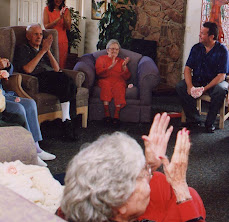The NPR piece below, "How Rhythm Carries A Poem, From Head To Heart," gives a wonderful description of the importance of rhythm in poetry. The poet Edward Hirsch says, "Spoken-word poetry brings back that ancient feeling of poetry as performance and poetry as contest; and poetry as spoken, chanted, sung."
My background as a performance poet and my involvement with the Poetry Slam informs and guides my work as the founder of the Alzheimer's Poetry Project (APP). I trace many of the techniques and methods of the APP to lessons I learned in how to engage the audience as a performance poet. That ancient sense of poetry as performance is at the core of the APP.
One of the reasons "call and response," works so well with people living with memory loss, is that it taps into what neurologists call, auditory sense or echoic memory. In the book "Nueroscience," temporal categories of memory are defined in three classes:
1. Immediate memory
2. Working memory
3. Long-term memory
The book states, "The capacity of immediate memory is very large, each sensory modality, (visual, auditory, tactile and so on) appears to have its own semi-independent "memory register." Accessing immediate memory through the auditory sensory modality, we are able to engage in the performance of poetry. We find a high degree of success in asking them to repeat back words they have just heard and the rhythm along with rhyme help to facilitate the recitation.
Here is a joyful and playful example of "call and response," using lines from the EE Cumming poem, "I Carry Your Heart."


